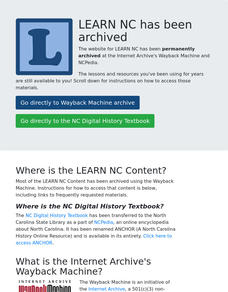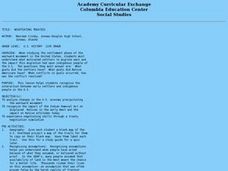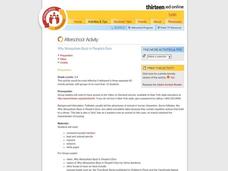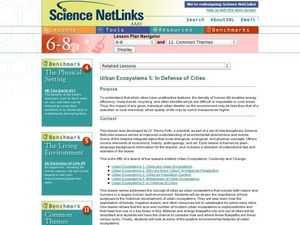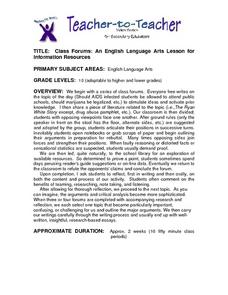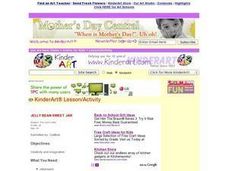Curated OER
Patterns In Fractals
Pupils find number patterns in the generation of several different types of fractals.
Curated OER
Lines, Rays, Line Segments, and Planes
Students are introduced to lines, rays, line segments and planes and study the differences between them. They also practice graphing lines, rays, line segments and planes
Curated OER
Lewis and Clark: The Language of Discovery
Students replicate some of the trailblazing methods of Lewis and Clark on a fifteen-minute "writing journey" through the school or neighborhood.
Curated OER
Chilly Discoveries
First graders make ice cream and determine what makes this liquid turn into a solid.
Curated OER
Negotiating Treaties
Eleventh graders recognize the interaction between early settlers and indigenous people in the U.S. They recognize the impact of the Indian Removal Act on displaced Natives in the early West and the impact on Native attitudes today.
Curated OER
Plants -- What Are Their Parts and Functions?
Students identify the parts of a flowering plant and their functions. They describe its life cycle as well. They compare the parts of the plant to the roles that are needed in a democracy.
Curated OER
Time-Axis Fallacy and Bayes Theorem
Students determine that knowledge of an event's outcome can affect the probability of the unknown outcome of an event that has already occurred.
Curated OER
Exploring Our Solar System #1
Students examine the different theories on how our solar system was formed. They discover the order of the nine planets. They also identify the surface features of each planet.
Curated OER
Bead It!
Fourth graders use colored beads in two problems and explore the use of proportional reasoning as a problem solving method. Working Students, in groups, explain their reasoning strategies orally, and through drawings.
Curated OER
Why Mosquitoes Buzz in People's Ears
Learners appreciate African folktales, make "connections" between geography and literature, and research facts about Africa's animals and present findings through art and writing.
Curated OER
Gonna Take a Sedimentary Journey
Students collect water samples from a local source, test it, filter it and identify the materials suspended in it. Students disucss the possible sources of sediment in their watershed.
Curated OER
What's That Brown Fuzzy Stuff On My Plum?
Students examine Koch's Postulates by actually using them. They perform each of the required four steps to show that the brown fuzzy fungus they see growing on stone fruit (plums, peaches, nectarines, cherries) is what causes them to rot.
Curated OER
The Acid Rain Test
Fourth graders engage in a research project to increase their ability to conduct experiments, interpret data and discuss results in a scientific paper. After doing a lab which simulates effects of acid rain, pairs of students write a...
Curated OER
Deep Jungle: New Frontiers
Young scholars study the world's rainforests for unusual plant and animal species. They explore how biologists use infrared cameras to explore jungles.
Curated OER
Quest for Gold
Students identify people involved in the Olympics in the past and explain how their ideas and actions have changed others' lives. they take notes during research and present the information in written or picture format.
Curated OER
Angles Lesson Plan
Students stud angles, and then play the "What's Your Angle?" game. They complete at least 10 computer generated problems from the Angles Applet.
Curated OER
Creating a Landmark Calendar-An Enterprise for Your School
Students scrutinize the steps necessary to produce a school calendar featuring local architectural sites and landmarks.
Curated OER
Water and Ice
Learners investigate what happens to solids and liquids when they change from one form to another. The amount od space taken by frozen water begins the discussion and students are led to formulate their own hypothesis to research.
Curated OER
Class Forums: An English Language Arts Lesson for Information Resources
Tenth graders listen to a controversial piece of writing. They with opposing viewpoints face one another. After ground rules are suggested and adopted by the group, 10th graders articulate their positions in successive turns.
Curated OER
Introduction to Scatter Plots and Correlation
Students examine the concept of scatter plots. They compare baseball statistics to locate the ones that correlate with winning, and identify the positive, negative, and no correlation in sets of data using MS Excel.
Curated OER
The Art Miles Mural Project
Students create over twelve hundred miles of themed murals for an art project. They discuss what they want their theme to be and practice drawing the pictures before painting the mural.
Curated OER
Water Quality Monitoring of Natural Water
Students set up their own monitoring system. They collect samples from an appropriate sampling site. They analyze data and determine the water quality. They present their information to the class and draw a conclusion.
Curated OER
Jelly Bean Sweet Jar
Students design their own jelly bean sweet jar. They glue jelly beans on the lid in a decorative fashion. They decorate the jar as they wish and give the jar as a gift.
Curated OER
Keep Spreading the News
Students examine the significance of communication in an engineer's life. They develop a list of ways engineers communicate with others, and write a book, newspaper, or story about engineers' role in the environment.
Other popular searches
- Proofreading
- Geometry Proofs
- Geometry Proofs Worksheets
- Proofreading Worksheets
- Proofreading and Editing
- Earthquake Proof Buildings
- Geometric Proofs
- Indirect Proofs
- Coordinate Geometry Proofs
- Proofreading Practice
- Circle Proofs
- Congruent Proofs





